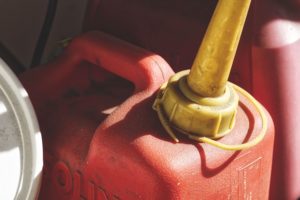Almost everyone has a red plastic gasoline can in their garage or tool shed. They are ubiquitous and easily purchased at any hardware store. But exploding gas cans are a real danger, especially when mishandled in hot weather. This common storage item can result in your surroundings being covered in flaming gasoline.

Thousands of adults and children have been burned or killed by exploding plastic gas cans. Why? And, what can you do to prevent this in your own home? The answers are simple.
What causes gas cans to explode?
Explosions typically occur when the vapors inside the gas can come into contact with flames or heat outside the can. A nearby open flame, cigarettes, sparks from appliance motors, or even static electricity can ignite gasoline vapor and cause the gas can to explode. Young children, who are known to play with matches, are particularly vulnerable.
Most of the inexpensive plastic gas cans are missing a simple flame arrestor that would prevent such explosions. A flame arrestor is a small piece of thin wire mesh that is located in the gas can spout. It allows the gasoline to pour out of the can but also prevents flames or heat from igniting the explosive gasoline vapors inside the can.
Sadly, gasoline can manufacturers have known or should have known about this danger for quite some time. Professional or commercial-grade gas cans have contained flame arrestors for over 100 years. Flame arrestors cost less than one dollar and are commonly used on water heaters, bottles of charcoal lighter fluid, and even bottles of Bacardi 151 rum.
In addition, professional or commercial-grade gas cans are equipped with spring-activated caps that close automatically and prevent vapors from escaping. Such cans are also typically made out of metal and have a round base which makes them less prone to tip over when being transported or bumped into.

Protect your family from gas cans exploding
The best way to protect yourself and your family from the dangers associated with dangerous plastic gas cans is to replace them with a professional or commercial-grade gas can. These can be easily purchased online at retailers such as Amazon.com and at traditional hardware stores, such as Lowes.
Although they are more expensive than plastic gas cans, the safety features that the metal cans include are worth it. Look for metal gasoline cans that are Underwriters Laboratories (“UL”) approved and check to see that they have a spring-loaded cap and a flame arrester.
How do I use a gas can safely?
It is also important to store, carry, and use gasoline safely. Here are some things to avoid:
- Don’t leave your gas can in the trunk of your car
It is extremely dangerous to leave a gasoline can in the trunk of your car because gas cans can explode in hot weather. If the trunk heats up from the sun, vapors inside the gas can expand and the increasing pressure will allow the vapors to escape. As the vapors accumulate, a gas can explosion could result. - Don’t use gas to light a fire
It is critically important that caution is used whenever gasoline is used. It should never be used to start a fire, such as a burn pile or campfire. Many explosions occur when people are pouring gasoline onto a burning fire. - Don’t use gas as a cleaning solvent or weed killer
Gasoline should also not be used as a cleaning solvent or to kill weeds. Gasoline was created for one purpose only, to power gasoline-powered engines. - Keep gasoline cans away from children
Gasoline should also be kept away from children who are too young to understand the dangers associated with it. Children playing around cheap gasoline containers can easily tip them over, allowing the gasoline to get near an ignition source.
The American Academy of Pediatricians estimates that over 40,000 emergency room visits by children occur each year as a result of gasoline-related exposure or injuries.
If you or someone you know has been burned or killed by an exploding gas can, give us a call. The personal injury attorneys at Allen, Allen, Allen & Allen have the experience and resources to properly investigate all types of burn injury cases.



